

2014 Outlook: Zara's Fashion Supply-Chain Edge. Arteixo is a small town in northwestern Spain near the Atlantic, surrounded by fishing villages.
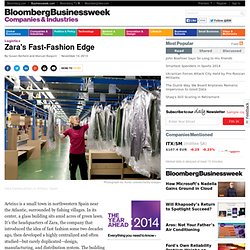
In its center, a glass building sits amid acres of green lawn. Rising cost of clothes could signal end to 'cheap chic' The days of "cheap chic" and throwaway fashion could be numbered, because the cost of clothes is rising at its fastest rate for nearly 15 years.
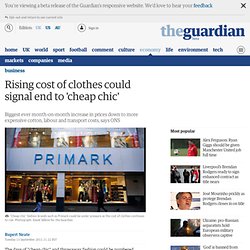
The "fast fashion" trend, where T-shirts sell for £2 and jeans are priced at less than a fiver in supermarkets, is being battered by big increases in the cost of cotton, labour and transport. Figures show the cost of clothing jumped 3.7% between July and August – the biggest month-on-month increase since the Office for National Statistics (ONS) started compiling the data in 1997. Fashion Inflation: Why Are Prices Rising So Fast? NEW YORK, United States — It’s easy to find a nice-looking pair of shoes for $40 these days, and even easier to find a trendy $40 dress. But while “fast fashion” prices are so light on the wallet they almost feel as though they’re going to disappear altogether, the cost of luxury goods continues to rise and rise, with no end in sight. Currently on luxury e-tailer Net-a-Porter, there are more than 100 pairs of shoes priced over $1,000. (Two pairs of sparkly Christian Louboutins exceed $6,000.)
And the price of Chanel’s famous 2.55 bag now rivals that of an Hermès Kelly. That is, an Hermès Kelly a decade ago. A nearly 60 percent price increase may seem excessive — especially when compared to the US Consumer Price Index (a measure of the price level of consumer goods, published by the US Bureau of Labor Statistics), which has increased by 27 percent over the past decade — but it’s typical in the luxury fashion category. So what’s driving up the prices and how far can they go?
Case studies from companies in the Fashion industry. London Fashion Week and a UK Growth Industry to Be Proud Of. Oxford Economics. New York Fashion Week: The Numbers And Economic Benefits Behind The World's Biggest Fashion Show. And while fashion is a hugely significant issue for New Yorkers, who spend a lot of money on the latest designer labels, NYFW has huge economic benefits to New York’s economy, generating about $850 million every year.
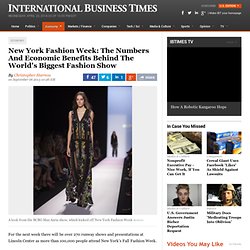
The annual Fall and Spring events bring in between $425 million and $435 million each as attendees flood into local restaurants, hotels and retail stores. The event, now in its 70th year, was founded by fashion publicist Eleanor Lambert in 1943 to showcase collections by American designers for the international press. In the beginning, only 53 female page editors showed up to cover it.
Today that number is nearer 200,000 for the biannual event. Last year the New York City Economic Development Corporation (EDC) analyzed the benefits that NYFW brought to the city and discovered that about $6 million is spent on hotels, $7 million in retail stores, $9 million on restaurants and $12 million on leasing venues for the week.
Let's Show the World that Fashion is Serious Business. LONDON, United Kingdom — When I first started writing BoF from my sofa back in 2007, one of my main motivations was to demonstrate that fashion is a serious business.
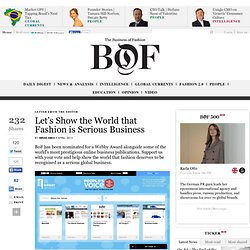
Having immersed myself in the industry in the preceding months, the magic of the fashion industry was simply fascinating to me. Where else could one find such dedicated, creative and hard-working people with a shared passion for their work? What other industry creates products that incite such passion? And which industry accepts and celebrates a cast of characters as colourful, diverse and entertaining as ours? The short answer? Unfortunately, fashion is portrayed in much of the mainstream media as a superficial industry composed of champagne-swilling flakes who have nothing better to do than to gossip and snicker.
Globally, fashion is a $1.5 trillion dollar industry. Being nominated is a huge honour for us. British fashion industry now worth nearly £21bn a year, report reveals. British fashion is not just about designer frocks; it is a serious business that contributes almost £21bn to the UK economy, according to the findings of a landmark report to be launched tomorrow on the eve of London Fashion Week.
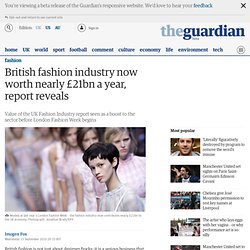
The Value of the UK Fashion Industry report was commissioned by the British Fashion Council and seeks for the first time to quantify the true economic and social impact of the UK fashion industry. The research highlights not only the direct impact of the fashion industry, including wholesale, retail and manufacturing, on the economy but also its effect on other industries including financial services and tourism. Ed Vaizey, minister for creative industries who launched the report alongside Vince Cable, noted its significance and said that it "confirms British fashion's status as one of our most important creative industries".
Alexander Shulman, editor of British Vogue, said she thought the report was "a very intelligent idea".